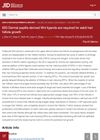Oncostatin M Is Upstream of JAK-STAT Signaling During the Murine Hair Cycle
April 2016
in “
Journal of Investigative Dermatology
”
Oncostatin M JAK-STAT signaling Prostaglandin D₂ PGD₂ PTGDR2 antagonists lithocholic acid LCA human dermal papilla cells hair follicle stem cells dsRNA KRT9 expression WNT/B-catenin signaling Lichen Simplex Chronicus gypenosides Gynostemma pentaphyllum procollagen synthesis periorbital wrinkles JAK-STAT PGD2 PTGDR2 dermal papilla cells hair stem cells WNT signaling Gynostemma collagen synthesis wrinkles

TLDR Blocking Oncostatin M's role in the JAK-STAT pathway can stimulate hair growth in mice.
The document reports on several studies related to hair growth and alopecia. One study demonstrated that Prostaglandin D₂ (PGD₂) inhibits hair growth, but PTGDR2 antagonists could counteract this effect, offering a potential alopecia treatment. Another study found that lithocholic acid (LCA) promotes hair growth by acting on human dermal papilla cells. The specific study on Oncostatin M established that it is involved in the JAK-STAT signaling pathway, which keeps hair follicle stem cells dormant during the hair cycle's resting phase in mice, and blocking this pathway can trigger hair growth. Additionally, dsRNA was shown to induce KRT9 expression via WNT/B-catenin signaling, which might be significant for skin conditions such as Lichen Simplex Chronicus. Research on developing hair follicles revealed complex signaling interactions among stem cell precursors, transit amplifying progenitors, and their environment. Lastly, a study on gypenosides from Gynostemma pentaphyllum indicated they could increase procollagen synthesis and decrease periorbital wrinkles in human subjects.


